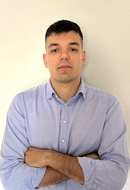Kacper Bilko (Switzerland)
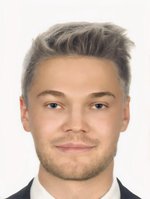
I am an applied physicist with a passion for data science, specializing in the accelerators’ radiation environment and its impact on electronic systems. Since 2017, I have been working at the European Organization for Nuclear Research (CERN), where, as of 2022, I am pursuing a PhD in collaboration with Jean Monnet University. The research focuses on CERN's radiation environment and the use of commercial silicon solid-state detectors for beam and radiation characterization. In my free time, I enjoy sailing, skiing, or participating in other mountain activities.
Virginia Boretti (Auditor) (Germany)

My name is Virginia Boretti, and I have been a PhD student at GSI and TU Darmstadt since December 2023. I earned my Bachelor’s degree in Physics and Astrophysics from the University of Florence and my Master’s degree in Physics from the University of Rome Tor Vergata, where I completed a thesis on characterizing the radiation field inside the International Space Station using data from the LIDAL detector. Following this, I continued my thesis project as a fellow researcher. My PhD research focuses on modeling the radiation exposure risk that astronauts face during space missions. This involves using simulations to evaluate the radiation environment and modeling the effects of ion exposure using the Local Effect Model developed at GSI. Additionally, my work aims to establish a biological benchmark for the GCR simulator at GSI.
Margot Clauss (Sweden)

Margot is a PhD student in space systems at Luleå University of Technology on the Kiruna space campus. She is investigating concepts to implement a space circular economy as the reuse of spacecraft materials and components. She is conducting a pilot study on the reuse, repair, and recycling of spacecraft solar panels.
Aneta Duskova (Czech Republic)
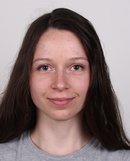
2023–present Doctoral programme, Nuclear Engineering at the Faculty of Nuclear Sciences and Physical Engineering, Czech Technical University in Prague
2021–2023 Master Diploma with honours, Nuclear Engineering - Applied Physics of Ionizing Radiation at the Faculty of Nuclear Sciences and Physical Engineering, Czech Technical University in Prague
⦁ Thesis: X-ray fluorescence microanalysis of wood
2016–2021 Bachelor Diploma, Applications of Natural Sciences - Dosimetry and Application of Ionizing Radiation at the Faculty of Nuclear Sciences and Physical Engineering, Czech Technical University in Prague
⦁ Project: X-ray fluorescence analysis of biological samples
Recent work experience
2024–present Department of Radiation Dosimetry, Nuclear Physics Institute of the Czech Academy of Sciences
2023–present Faculty of Nuclear Sciences and Physical Engineering, Czech Technical University in Prague
2022–2023 National Technical Museum
Gabriele Ellena (Belgium)

Education:
- FWO PhD in Bioscience Engineering (2023 - Current), University of Antwerp and SCK CEN, Belgium
- Research on Microbe-Based Food Supplements for extraterrestrial environments.
- MSc in Biology of Extreme Environments: Astrobiology (2021 - 2023), University of Naples Federico II, Italy
- BSc in Hygiene and Exercise Sciences (2018 - 2021), SUISM, Torino, Italy
Work Experience:
- Master thesis Internship (2022 - 2023), SCK CEN, Mol, Belgium
- Impact of simulated microgravity on the life support system cyanobacterium L. indica.
- Research Assistant Internship (2021 - 2022), University of Naples Federico II, Italy
- In microbiology and biochemistry laboratories
Marco Hofmann (Germany)
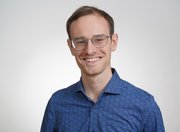
Marco Hofmann marco.hofmann(at)tu-darmstadt.de
www.linkedin.com/in/hofmann-physics
- Interests: Radiation therapy, DNA-repair, FLASH, Monte-Carlo simulations
- Skills: Optimization and Monte-Carlo methods in C++, data analysis in Python and Mathematiaca
Research experience
since 10/2021 Doctoral Researcher, TU Darmstadt
Thermodynamics and transport in dense, strong-interacting matter
02/2024 - 05/2024 Research Internship, Washington University in St. Louis
Calculation of neutrino mean free paths in quark matter
04/2019 - 07/2021 M.Sc. Physics, TU Darmstadt
Quantum dynamics in fluctuating systems
Publication: M. Hofmann and B. Drossel. New J. Phys. 23 103025
Kim Knorr (Auditor) (Germany)

Kim Knorr
04/2023-now: PhD Student at GSI Helmholtzzcenter for Heavy Ion Research GmbH
Effects of space radiation and microgravity on region-specific brain organoids
08/2022 – 02/2023: Master thesis at GSI Helmholtz Center for Heavy Ion Research GmbH
- Effects of X-Ray irradiation on brain organoid slices co-cultured with tumor-like cells
4/2021-03/2023: M.Sc. in Biology at the Technical University of Darmstadt
09/2020 – 12/2020: Bachelor thesis at GSI Helmholtz Center for Heavy Ion Research GmbH
- Comparison of two different cerebral organoid models on mRNA and protein level
10/2017-01/2021: B.Sc. in Biotechnology at Darmstadt University of Applied Sciences
Luca Lunati (Auditor) (Germany)
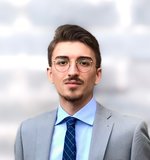
My name is Luca Lunati, and I have been a PhD student at the GSI Biophysics Department and TU Darmstadt since December 2023. Prior to starting the PhD, my research focused on studying the space radiation environment and the risks of radiation exposure for astronauts. I obtained my Bachelor's Degree in Physics and Astrophysics at Sapienza University of Rome and my Master's Degree in Physics at the University of Rome Tor Vergata, where my thesis involved data analysis of the LIDAL detector on board the International Space Station. After graduation, I was awarded a research grant at the Physics Department of the University of Rome Tor Vergata, where I continued working on the LIDAL experiment. My current research project at GSI involves the design and construction of the Galactic Cosmic Ray Simulator at FAIR, which will provide Europe with its first facility capable of reproducing the full GCR spectrum on ground.
Ricardo Minaya Sainz (UK)
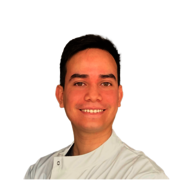
Ricardo is a Higher Scientific Officer and PhD student working within the labs of Dr Erik Wennerberg and Prof Alan Melcher at The Institute of Cancer Research (ICR), London. He studied Biochemistry at the National Autonomous University of Mexico (UNAM); during this time, he won a couple of travel grants to do a summer research project at University College London and a semester abroad at Calgary University, Canada. He then completed an MRes in Cancer Biology from Imperial College London and an MSc in Radiation Biology from Oxford University. Ricardo’s PhD project focuses on improving the anti-tumour immune response post-radiotherapy in cancers resistant to immunotherapy by modulating the metabolism of immune cells.
Elpiniki Ninou (Greece)
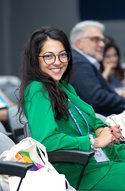
Dr. Elpiniki Ninou is a biologist, a graduate of the Department of Biology of the University of Athens. She holds a MSc in Molecular Medicine from the School of Medicine of the University of Athens and a Doctorate from the Department of Biology of the University of Athens. Her research interests focus on Neurobiology, Developmental Biology, and the mechanisms of neurodegeneration. She has worked with research groups in Athens (BRFAA), Valencia (IATA-CSIC), Dresden (DZD/PLID) and San Francisco (UCSF) and she is a NASA STAR-4 alumni. She has participated in several publications in prestigious international scientific journals and in several Greek and European research programs. Since September 2022, she works as a postdoctoral researcher at the Laboratory of Cellular and Molecular Neurobiology of the Hellenic Pasteur Institute, in the group of Dr. Era Taoufik, and her main research topic is the molecular profiling of microglia in human and animal models of familial Parkinson's disease.
Kristyna Olsson Hermanova (Czech Republic)
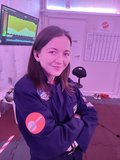
Kristyna Olsson Hermanova holds a BSc in Biomedical Engineering from the University of North Carolina at Chapel Hill and an MSc in Medical Physics from Delft University of Technology. During her studies, she completed an internship in MR image analysis at Johns Hopkins Medicine and a master thesis project on the visualization of quantitative characteristics of brain lesions at Sahlgrenska University Hospital. She currently works as a medical physicist at the Czech Proton Therapy Center and is concurrently completing her clinical traineeship in radiotherapy. Kristyna also has a passion for space missions and joined a 2.5-week simulated mission as an analog astronaut at the Lunares Research Station in Poland this past February. In her free time, Kristyna enjoys going on long hikes in the mountains, playing tennis and danci
Mark Ayor Osabutey (USA)
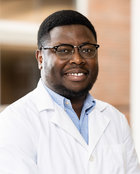
Mark Ayor Osabutey MD MS
Education:
- Ph.D. in Neuroscience, University of Rochester (Expected May 2026)
- M.Sc. in Neuroscience, University of Rochester (Dec 2023)
- Bachelor of Medicine and Bachelor of Surgery (MBChB) – MD Equivalent, Kwame Nkrumah University of Science and Technology (Jun 2018)
- B.Sc. in Human Biology, Kwame Nkrumah University of Science and Technology (Jul 2015)
Professional Experience:
- PhD Candidate, University of Rochester (Aug 2021 - Present)
- Graduate Teaching Assistant, Brain and Cognitive Sciences, University of Rochester (Jan 2024 – May 2024)
- Medical Doctor (and Research Assistant), University Hospital KNUST (Oct 2019 - Jul 2021)
- Medical Doctor (and Research Assistant), Komfo Anokye Teaching Hospital (Oct 2018 – September 2019)
Honors:
- 3rd Place Poster Award, NASA Human Research Program Investigators Workshop (2024)
- $25,000 Grant Augmentation Award, NASA Human Research Program (2023)
- Dean’s Doctoral Fellowship Scholarship Award, University of Rochester School of Medicine and Dentistry (2021)
- Vice Chancellor's Excellence Award, School of Medical Sciences KNUST (2015)
Alexis Papadopoulos (Greece)
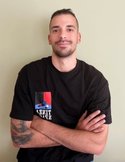
Alexis Papadopoulos studied in the Physics Department (BSc) at the University of Athens (NKUA) and continued his postgraduate studies in astrophysics (MSc) at the same department, specializing in space physics. Currently, he is a doctoral candidate in the medical physics laboratory at the University of Ioannina under the supervision of Prof. Dimitris Emfietzoglou. His doctoral research focuses on microdosimetry calculations for ions towards estimates of space radiation risk to astronauts and late stochastic effects in hadron therapy. His doctoral thesis is supported by grants from the University of Ioannina (co-funded by Greece and EU) and the European Space Agency (ESA)
Madalina Patron (Canada)
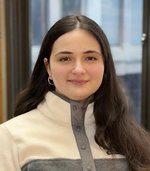
My name is Madalina, and I am an incoming PhD student in Biomedical Engineering at the University of Alberta, Canada. My interest in space related research started after joining the student rocket design team at McGill University during my undergraduate studies. Leading projects for prototypes capable autonomous immune cell activity detection in sounding rockets solidified my passion for bioastronautics research. To pursue a more serious career, I focused my masters research at McGill University and Shriners Hospital for Children under Dr. Svetlana Komarova, on the effects of spaceflight on astronauts bone physiology, while also devoting time for community involvement by aiding in organizing the Launch Canada competition and investigating undergraduate student's research experience alongside Dr. Tamara Western in the Faculty of Science Education, McGill. I aim to build upon these experiences during my PhD studies to lead research exploring the physiological effects of cosmic radiation.
David Pelosi (Italy)
During my studies at the University of Perugia, I have focused on cosmic ray physics and their interactions with the heliosphere and long-term variations driven by solar activity. For my bachelor's thesis, I created a real-time model of cosmic ray flux at the top of the atmosphere using a Force-Field approach to solve Parker's equation, calibrated with neutron monitor data. In my master's thesis, as a part of the CAESAR project funded by the Italian Space Agency, I developed a data-driven predictive model for cosmic ray fluxes using AMS-02 and PAMELA data, using previously defined correlations with solar activity. Currently, I am a first-year PhD student in the Department of Physics and Geology at University of Perugia, working with the AMS-02 experiment collaboration on cosmic ray propagation and predictive space weather models.
Gökhan Sancak (UK)
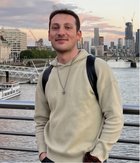
In 2014, I joined the Turkish Air Force Academy as a cadet, receiving both military and academic training. After two years at the Academy, I completed my undergraduate degree in Aerospace Engineering at Istanbul Technical University in 2019. Supported by Boeing, I conducted research on advanced nanomaterials at the Aerospace Research Centre, benefiting from the opportunity to work with excellent colleagues.
Currently, I am in my first year of a PhD program in Advanced Composites at the University of Bristol, funded by the Engineering and Physical Sciences Research Council (EPSRC). My current project, Advanced Exploration Guard In Space (AEGIS), focuses on developing materials for radiation shielding, specifically aiming to create a composite material using polybenzoxazine resins to combat space radiation.
Beyond my academic pursuits, I engage in oil painting, writing, and poetry. These activities are not only hobbies but also avenues for broadening my understanding of life and the diverse experiences it offers.
Margherita Simoni (Italy)
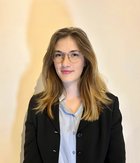
I am Margherita Simoni, a first year PhD student at the University of Rome Tor Vergata. I graduated at the same University in June 2023, with a master’s degree in physics, during which I developed an interest in the advancement of radiation protection, as well as particle therapy. My studies led me to pursue a PhD in Physics, with a focus on the computational methods and experimental techniques employed to perform and validate simulations of thermal neutron transport inside organic materials, for applications in the field of boron neutron capture therapy (BNCT). I am currently employing Geant4 Monte Carlo simulations to compare multiple thermal neutron cross section models to discuss the impact they have on delivered dose.
Giacomo Ubaldi (Italy)
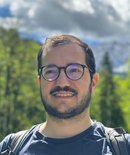
I am attending my Ph.D. in Physics at Bologna University (Italy) with a scholarship funded by the Italian Institute of Nuclear Physics (INFN). My research activity concerns data analysis and data acquisition management for the FOOT (FragmentatiOn Of Target) experiment. Moreover, in this academic year I have been pursuing the role of tutor for the courses of “Electromagnetism” for physicists and "General Physics" for engineers at Bologna University.
Currently, I am joining as a PhD visitor the Chair of Medical Physics at LMU (Munich, Germany) for the SIRMIO project, where my activity is focused on the optimization and evaluation of a single-particle tracking pCT system.
My research interests are focused on the physics of nuclear interactions and its applications to cancer therapy and radioprotection in space.




